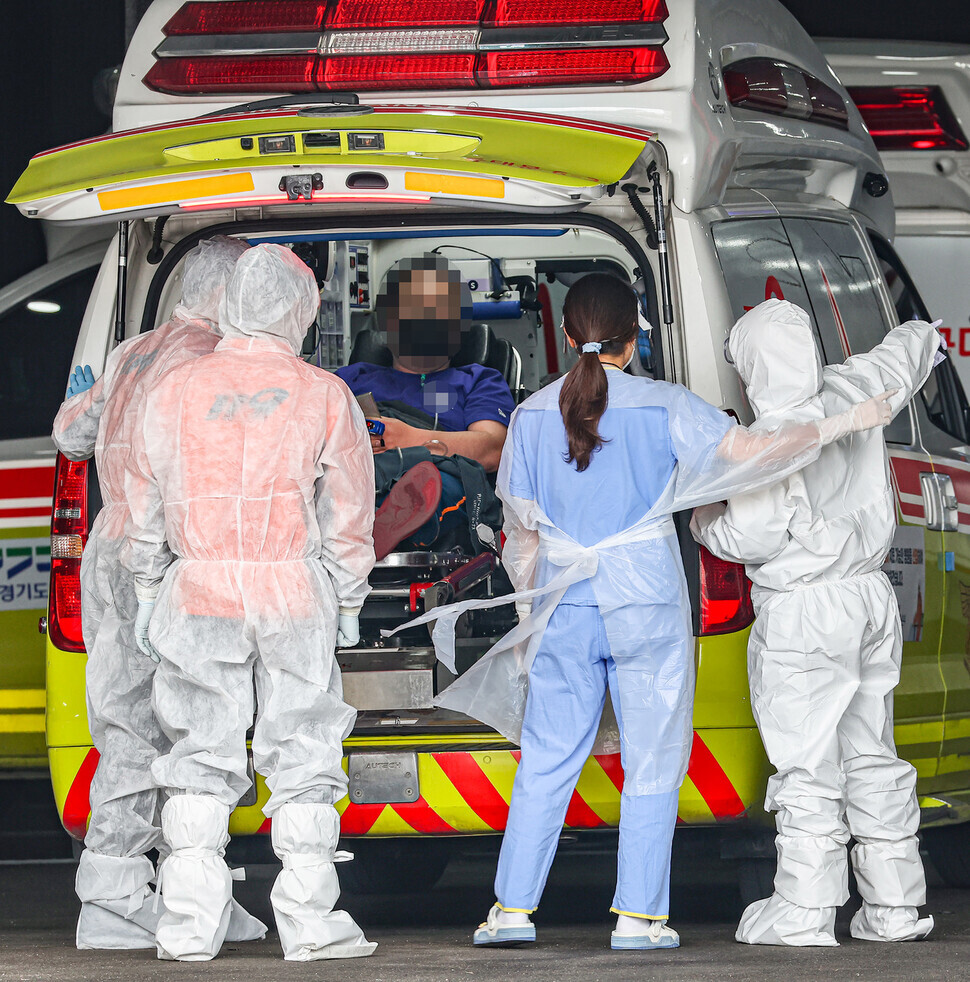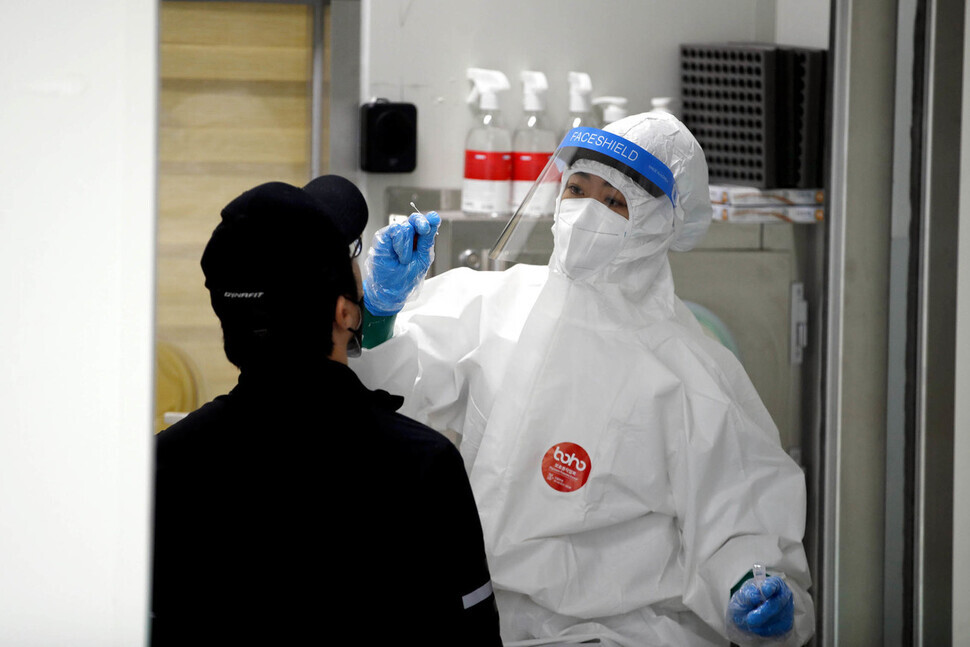hankyoreh
Links to other country sites 다른 나라 사이트 링크
Schools, workplaces hobble along as S. Korea tallies 1M COVID-19 cases in span of 2 days

Healthcare settings nationwide have been facing major chaos as South Korea recorded its first-ever daily new COVID-19 caseload in excess of 600,000, with over 400 new deaths counted as of the end of the day Wednesday.
Hospitals, clinics, health care centers and pharmacies have been complaining of staff and medication shortages as they operate above their capacities, while patrons have been left fuming over the confusion on the ground. Ordinary workplaces are also fretting over the blow to their operations as the number of confirmed cases skyrockets.
Neighborhood hospitals and respiratory clinics that provide specialist rapid antigen testing have been thronged with visitors.
“You’re going to have to wait about 20 minutes,” a reception desk employee said at an ear, nose, and throat clinic near Gwanghwamun Station in Seoul’s Jongno District at around noon on Thursday.
“Normally, people have to wait around 40 minutes, so this is actually faster than usual,” they added.
There were already quite a few people in the waiting room, but the visitors kept coming — many of them working people looking to take advantage of their lunch break to undergo a rapid antigen test.
“There are only three designated COVID-19 testing clinics in this neighborhood, so it’s normal for patients to wait for an hour,” said a 54-year-old surnamed Lee who lives in Ilsan, Gyeonggi Province.
“The line stretches out into the hallway in front of the clinic. It takes longer than a public health center test, and it looks riskier,” they added.

Demand for antipyretics and cold medications has been skyrocketing.
“We have so many people with COVID-like symptoms that we’ve run out of Tylenol,” said an employee at one pharmacy in Seoul’s Gwanak District. “We’re now recommending other antipyretics.”
A 40-something resident surnamed Jeong in Yongin, Gyeonggi Province, said, “After I was diagnosed with COVID-19, my husband went to four different nearby pharmacies, and even as far as Seoul, to get medicine that’s supposed to be good for a sore throat, but he couldn’t find it.”
A pharmacist in western Ilsan said, “Anti-inflammatory antipyretics are essential prescriptions for COVID-19, but the wholesaler hasn’t even been taking orders for them since early last week.”
“I called the pharmaceutical company myself, and they said the new shipment from the production company was supposed to come in no earlier than late March or so,” they added.
“Once we’ve run out of stock, we’ll have no choice but to tell people to buy regular over-the-counter cold medicine. We’re already struggling with the flood of patients, but I take every chance I get to call up the wholesaler and pharmaceutical company to ask them when [the medications] are supposed to arrive,” they said.
The explosive increase in confirmed cases has also led to bigger vacuums in the management situation for disease control authorities.
Healthcare institutions are often unable to keep up with the obligation to call twice a day to check on the condition of patients aged 60 and up who are classified as a “focused management” segment.
“Yesterday, the hospital only called me once, and I haven’t been called today as of this morning,” said an 80-something resident surnamed Im in the southeastern city of Gimhae who is undergoing home treatment.
A 67-year-old resident surnamed Mun in Seoul’s Gwanak District said, “My grandson is undergoing home treatment, but even when his temperature has gone up over 40 degrees [Celsius], the line is always busy at the pediatrician who prescribed his medication.”
“It’s been nerve-racking,” Mun said.
The shortage of dedicated COVID-19 hospital beds has made it increasingly common for pregnant women to have to be sent to hospitals hundreds of kilometers away to give birth.
One expectant mother in Pyeongtaek, Gyeonggi Province, was told on March 13 that over 30 hospitals in the greater Seoul and Gangwon Province area were unable to accommodate her. After asking around, she was finally transferred to Gyeongsang National University Hospital in Changwon to give birth.
On March 10, a pregnant woman in her 30s in Gwangmyeong, Gyeonggi Province, had to be taken by ambulance all the way to Hongseong County in South Chungcheong Province. On March 8, a woman in Gwangju, Gyeonggi Province, was taken by helicopter to Namwon, North Jeolla Province, to give birth.
The sharp rise in cases has also created a vacuum for schools.
A 30-year-old teacher surnamed Park at a high school in Gumi, North Gyeongsang Province, said, “We have a lot of confirmed cases among students, but now five or six of my fellow teachers have also tested positive and gone into isolation.”
“Other teachers have been doing the [sick] teachers’ classes as make-up sessions, and when there are too many of those make-up sessions, the students are being asked to study on their own,” Park explained.
In many cases, working people are unable to take time off even after testing positive. A 29-year-old employee at one SME in Seoul said, “I’ve been in isolation after testing positive on March 14, but I keep getting contacted by the company and customers.”
“I know this is the busiest time of year for our team, but it’s upsetting that I have to work when I’m not feeling well,” she added.
“I’ve lost a lot of my voice, so I asked if I could communicate by text. But when I’ve been communicating with these people with my head all groggy from medications and sleepiness, I’ve found myself thinking, ‘What am I doing?’”
A 48-year-old office worker surnamed Kim in Seoul’s Seocho District said, “We’ve already had so many confirmed cases at our company that we wouldn’t be able to function if I got infected too.”
“I’ve had some symptoms of body aches, but I keep putting off getting a rapid antigen test,” Kim added.
“We’ve switched to working from home, but it makes me uneasy thinking that I could create problems for my family because of work.”
By Kim Kwang-soo, staff reporter; Seo Hye-mi, staff reporter; Lee Woo-yun, staff reporter
Please direct questions or comments to [english@hani.co.kr]

Editorial・opinion
![[Correspondent’s column] The real reason the US is worried about Chinese ‘overcapacity’ [Correspondent’s column] The real reason the US is worried about Chinese ‘overcapacity’](https://flexible.img.hani.co.kr/flexible/normal/500/300/imgdb/original/2024/0510/5217153290112576.jpg) [Correspondent’s column] The real reason the US is worried about Chinese ‘overcapacity’
[Correspondent’s column] The real reason the US is worried about Chinese ‘overcapacity’![[Editorial] Yoon’s gesture at communication only highlights his reluctance to change [Editorial] Yoon’s gesture at communication only highlights his reluctance to change](https://flexible.img.hani.co.kr/flexible/normal/500/300/imgdb/original/2024/0510/7717153284590168.jpg) [Editorial] Yoon’s gesture at communication only highlights his reluctance to change
[Editorial] Yoon’s gesture at communication only highlights his reluctance to change- [Editorial] Perilous stakes of Trump’s rhetoric around US troop pullout from Korea
- [Guest essay] Preventing Korean Peninsula from becoming front line of new cold war
- [Column] The state is back — but is it in business?
- [Column] Life on our Trisolaris
- [Editorial] Penalties for airing allegations against Korea’s first lady endanger free press
- [Editorial] Yoon must halt procurement of SM-3 interceptor missiles
- [Guest essay] Maybe Korea’s rapid population decline is an opportunity, not a crisis
- [Column] Can Yoon steer diplomacy with Russia, China back on track?
Most viewed articles
- 1[Correspondent’s column] The real reason the US is worried about Chinese ‘overcapacity’
- 2[Editorial] Yoon’s gesture at communication only highlights his reluctance to change
- 3Yoon rejects calls for special counsel probes into Marine’s death, first lady in long-awaited presse
- 4[Book review] Who said Asians can’t make some good trouble?
- 5With climate lawsuits, youth around the globe are fighting for their future
- 6Nuclear South Korea? The hidden implication of hints at US troop withdrawal
- 7Korea likely to shave off 1 trillion won from Indonesia’s KF-21 contribution price tag
- 8How many more children like Hind Rajab must die by Israel’s hand?
- 9Korea poised to overtake Taiwan as world’s No. 2 chip producer by 2032
- 10Yoon voices ‘trust’ in Japanese counterpart, says alliance with US won’t change